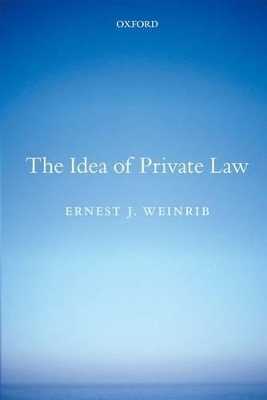
The Idea of Private Law
Seiten
2012
|
Revised edition
Oxford University Press (Verlag)
978-0-19-966581-5 (ISBN)
Oxford University Press (Verlag)
978-0-19-966581-5 (ISBN)
This revised edition of The Idea of Private Law makes available one of the major works of modern legal theory. It includes a new introduction by the author, looking back at the work, its origins, and its aspirations.
Nearly twenty years after its original publication, The Idea of Private Law is widely recognized as a seminal contribution to legal philosophy, and one of the leading attempts to explain and justify the moral foundations of private law. Rejecting the functionalism popular among legal scholars, Ernest Weinrib advances the provocative idea that private law is an autonomous and non-instrumental moral practice, with its own structure and rationality. Weinrib draws on Kant and Aristotle to set out an approach to private law that repudiates the identification of law with politics or economics. Weinrib argues that private law is to be understood not as a mechanism for promoting efficiency but as a juridical enterprise in which coherent public reason elaborates the norms implicit in the parties' interaction.
Private law, Weinrib tells us, embodies a special morality that links the doer and the sufferer of harm. Weinrib elucidates the standpoint internal to this morality, in opposition to functionalists, who view private law as an instrument in the service of external and independently justifiable goals. After establishing the inadequacy of functionalist approaches, Weinrib traces the implications of the formalism he proposes for our ideas of the structure, coherence, and normative grounding of private law. Furthermore, the author shows how this formalism manifests itself in the leading doctrines of private law liability. Finally, he describes the public but non-political role of the courts in articulating the special morality of private law.
This revised edition makes accessible one of the major works of modern legal theory. It includes a new introduction by the author, looking back at the work, its origins, and its aspirations.
Nearly twenty years after its original publication, The Idea of Private Law is widely recognized as a seminal contribution to legal philosophy, and one of the leading attempts to explain and justify the moral foundations of private law. Rejecting the functionalism popular among legal scholars, Ernest Weinrib advances the provocative idea that private law is an autonomous and non-instrumental moral practice, with its own structure and rationality. Weinrib draws on Kant and Aristotle to set out an approach to private law that repudiates the identification of law with politics or economics. Weinrib argues that private law is to be understood not as a mechanism for promoting efficiency but as a juridical enterprise in which coherent public reason elaborates the norms implicit in the parties' interaction.
Private law, Weinrib tells us, embodies a special morality that links the doer and the sufferer of harm. Weinrib elucidates the standpoint internal to this morality, in opposition to functionalists, who view private law as an instrument in the service of external and independently justifiable goals. After establishing the inadequacy of functionalist approaches, Weinrib traces the implications of the formalism he proposes for our ideas of the structure, coherence, and normative grounding of private law. Furthermore, the author shows how this formalism manifests itself in the leading doctrines of private law liability. Finally, he describes the public but non-political role of the courts in articulating the special morality of private law.
This revised edition makes accessible one of the major works of modern legal theory. It includes a new introduction by the author, looking back at the work, its origins, and its aspirations.
A native of Toronto, Ernest Weinrib has a PhD from Harvard (1968) and a BA (1965) and a JD (1972) from the University of Toronto. He has been teaching law at the University of Toronto since 1972, and has been a visiting professor at the Yale Law School and at Tel Aviv University. He holds the rank of University Professor (the University of Toronto's highest honour) and is the Cecil A. Wright Professor of Law. His major works also include Corrective Justice (OUP 2012).
Preface to the Revised Edition ; 1. Understanding Private Law ; 2. Legal Formalism ; 3. Corrective Justice ; 4. Kantian Right ; 5. Correlativity ; 6. Negligence Liability ; 7. Strict Liability ; 8. The Autonomy of Private Law
| Erscheint lt. Verlag | 25.9.2012 |
|---|---|
| Verlagsort | Oxford |
| Sprache | englisch |
| Maße | 166 x 240 mm |
| Gewicht | 552 g |
| Themenwelt | Geisteswissenschaften ► Philosophie ► Ethik |
| Recht / Steuern ► Allgemeines / Lexika | |
| Recht / Steuern ► EU / Internationales Recht | |
| Recht / Steuern ► Privatrecht / Bürgerliches Recht ► Internationales Privatrecht | |
| ISBN-10 | 0-19-966581-8 / 0199665818 |
| ISBN-13 | 978-0-19-966581-5 / 9780199665815 |
| Zustand | Neuware |
| Informationen gemäß Produktsicherheitsverordnung (GPSR) | |
| Haben Sie eine Frage zum Produkt? |
Mehr entdecken
aus dem Bereich
aus dem Bereich


